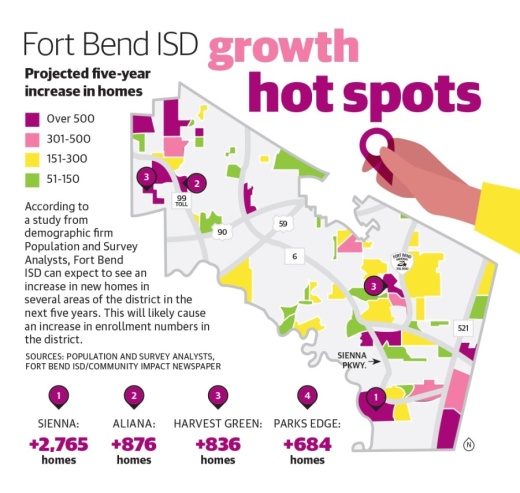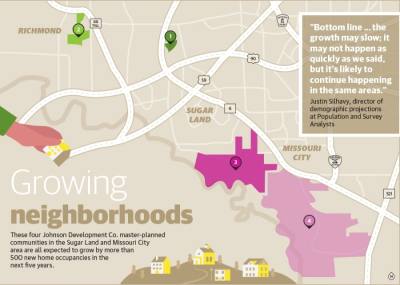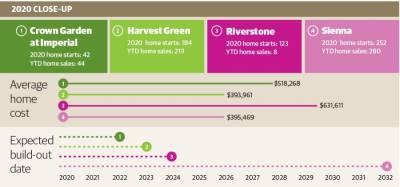While the coronavirus pandemic initially caused some slowdowns in new home construction and sales, local real estate professionals said these areas picked up again in May.
Still, FBISD is anticipating slower enrollment growth following the economic downturn caused by the pandemic. This, coupled with economic uncertainty, has led district officials to recommend delaying the construction and opening of several new schools.
Projected growth
In the next five years, subdivisions including Sienna, Imperial, Riverstone and Harvest Green in the Sugar Land and Missouri City area are each expected to add more than 500 new housing occupancies, according to PASA data presented to the FBISD board of trustees earlier this year.
Kunal Seth of The Seth Brothers Team with eXp Realty said these four Fort Bend County communities have always been in high demand.
“If a builder has a good product line and if they’re building in a good master-planned community like Harvest Green, Imperial, Sienna, or Riverstone, the demand has picked up significantly,” Seth said.
PASA projected one master-planned community—Sienna—to have 2,765 new housing occupancies from 2019-24 and another 2,610 from 2024-29.
Sienna, along with developments under construction along the FM 521 corridor, will add more than 9,000 new single-family home occupancies in the next 10 years, according to PASA data.
Justin Silhavy, the director of demographic projections at PASA, said while he is unsure of the coronavirus’s full effect on growth, he anticipates it will slow but continue to happen in the same areas as previously projected.
“We’ve seen that time and time again, with every disaster, every recession. So, the plans we help provide school districts, they don’t usually change, the timing might be adjusted,” Silhavy said.
In February, PASA projected in the next 10 years FBISD will need four to five new elementary schools in the southeast portion of the district to accommodate enrollment growth in these areas.
So far, FBISD has planned two elementary schools for the area, but at the June 8 board of trustees meeting, the district proposed delaying the construction and opening of these schools.
Superintendent Charles Dupre said at the meeting any time there is a significant economic downturn, such as the one caused by business restrictions in place because of the coronavirus pandemic, enrollment growth slows.
“We’re busy preparing, again in a conservative way, to see how this will affect use and construction and opening of new facilities,” Dupre said.
Christen Johnson, the senior vice president of marketing at Johnson Development Co., said there was a slowdown of home starts in Fort Bend County’s master-planned communities in May. However, fewer available inventory homes and the uptick of interest in move-in-ready houses caused home starts to pick up in June.
During the early stages of the coronavirus pandemic, Seth said some builders delayed putting new inventory homes on the market because of widespread uncertainty. However, he said even three months out, many builders believe the economic effects of the coronavirus are behind them.
“[Builders] are putting a lot of homes on the market for inventory because they feel that the COVID-19 issue is in the rearview mirror,” Seth said.
Effects of the coronavirus
Silhavy said he thinks the coronavirus affects the real estate market in two ways: low mortgages and job loss. These trends will determine how much population growth the area sees, he said.
“Right now, we’re in a situation where mortgages are at a historic low,” Silhavy said. “So people are buying houses, even during the pandemic.”
Seth said the 2.75%-3.25% interest rates, the lowest rates for conventional loans in the last 10-20 years, are increasing purchasing power for buyers.
“If I can get a loan at 3% versus 4%, well that’s a huge savings, so I can buy a more expensive home,” Seth said.
Seth said in the initial stages of the coronavirus pandemic, many of his clients did pause their search for a new home because of economic and job uncertainty. But he said many of them now feel the market is more stable.
“After 30-45 days ... [buyers] came out and bought a lot of homes,” Seth said. “So buyers who had taken a backseat, suddenly they’ve come up, and there’s been an influx of demand.”
Johnson said Johnson Development Co.’s master-planned communities are favorable among buyers.
“Low-mortgage interest rates, low resale and new home supply, virtual sales opportunities and notable buyer urgency are all contributing to strong demand,” Johnson said in an email.
In the Greater Houston area, pending sales for new homes were down 15%-20% in March and April, which in turn caused closings to be down 20% in May, according to data provided by Seth. However, there were 10,599 pending sales on single-family homes in May, up 23% compared to May 2019.
Seth said as long as there are no more stay-at-home orders issued because of the coronavirus, he expects the upward trend in home sales to continue.
“We are projecting much higher sales in all the months going forward, unless we are in lockdown and the market is shut down because of COVID-19,” Seth said. “The trends are showing June 2020 is going to be better than June 2019, and July and August the same way.”
Silhavy said the long-term effect of the coronavirus on the local real estate market is tied to whether there is sustained job loss from the coronavirus, especially in markets like the oil and gas sector.
“If we do see sustained job losses—and again if, because I don’t know if we will—we’ll definitely see less gains in population, which would, in turn, mean, you’d see a slowdown in building for sure,” Silhavy said.
However, Silhavy said the widespread job loss due to restrictions on restaurants and other retail businesses during the coronavirus pandemic will have less of an effect on the local real estate market because those job losses are occurring everywhere.
From May 13 to June 13, 12,811 people in Fort Bend County filed unemployment claims, according to the most recent data from the Texas Workforce Commission. This number is down from 21,939 claims filed from April 15 through May 16. The top three sectors experiencing the most job loss locally were restaurants, oil and gas support services, and grade schools.
Unemployment and job loss stemming from the coronavirus pandemic may also affect whether FBISD can call a bond election as planned in November 2021, Dupre said. Funds approved in the bond election would be used for the construction of some of the new schools that would be necessary to accommodate growth from new homes in the district.
“I just cannot re-emphasize enough how this pandemic and the uncertainty at all levels will have an impact on us in many ways for years to come,” Dupre said.









